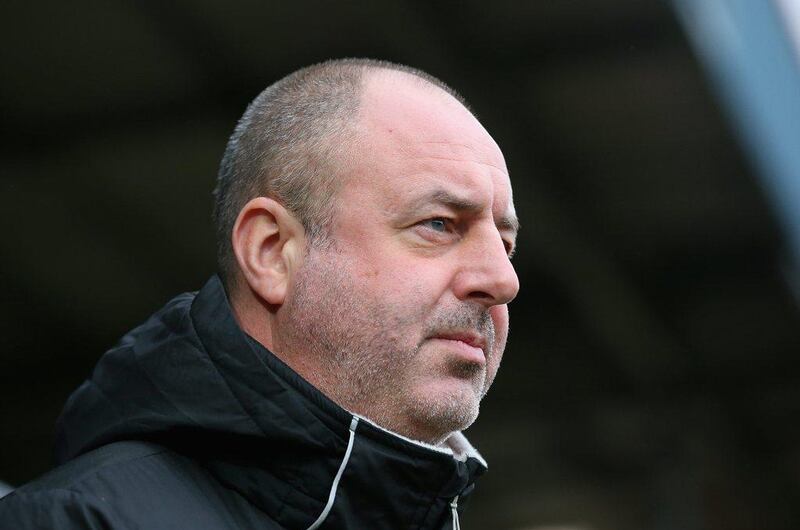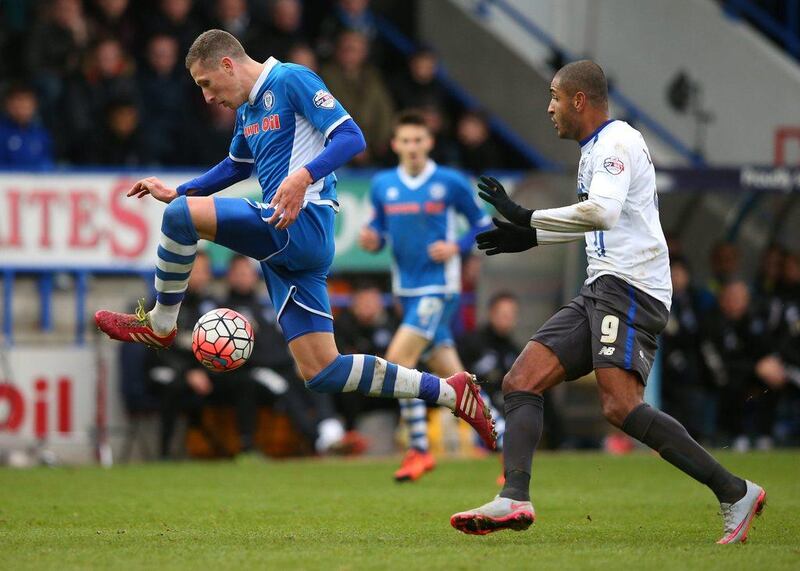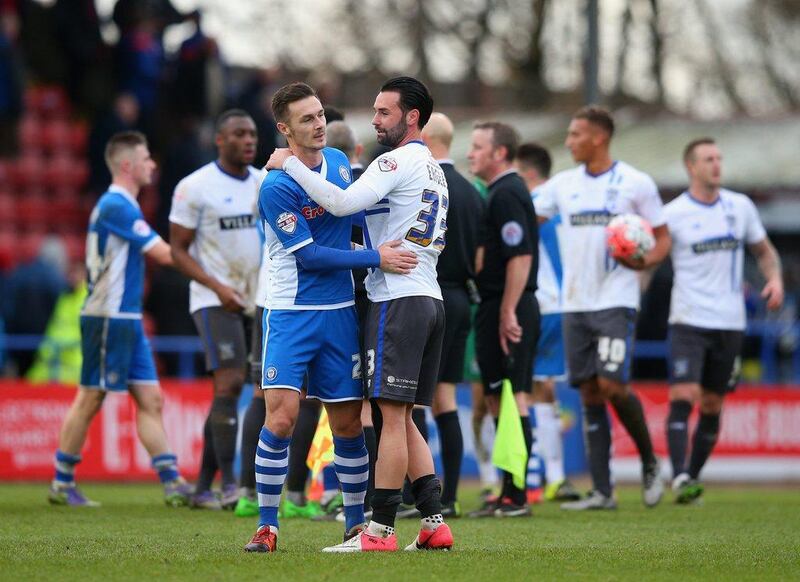As the rain lashes against the windows, conversation inside Rochdale’s club shop is impassioned.
“We’re not Inter Milan, we’re Rochdale,” explains one lady. The club are having a competition where fans decide the League One club’s home and away shirts next season from a choice of six. All are on display before their side’s FA Cup second-round derby tie against neighbours Bury.
“But we must have black and blue stripes,” counters her male companion. “It’s distinctive. It’s Dale.” Both fans register their votes and refuse to tell each other how they voted.
The 15-minute walk from Rochdale’s train station to the town centre is as bleak as the moors which edge the once prosperous mill town in England’s north-west, famed for being the birthplace of the co-operative movement.
Eventually though, the tacky shops, bars with garish signs and boarded up pubs give way to a view of the splendid Victorian Gothic town hall. Rochdale is much maligned, and not without reason.
“Like a lot of northern former mill towns, Rochdale is down on its luck, really down,” says Rochdale supporter Aidy Bibby. “There are plans to give the town centre a lift, but when you have the main hospital shutting and big stores like B&Q closing, it’s another nail in the coffin.”
Read more: Andy Mitten on how Manchester United's Class of '92 sparked a revolution at Salford City
Yet after decades of despair, Rochdale AFC have come good and provided serious cheer for the town of 95,000 situated 10 miles north-east of Manchester.
In 2010, Dale were promoted from League Two, England’s fourth tier, which they had not left since 1974. They were soon relegated but they are back up in League One, the third tier, and thriving in a league with a northern English flavour: 16 of the 24 clubs are within a 90-minute drive of Rochdale. All are better funded than Dale, who can rely on a hardcore of only 2,500 fans, yet they are stable in mid-table.
Bigger names have slipped out of the Football League, but while Rochdale have finished 92nd out of 92 six times, they have managed to avoid such ignominy since relegation to non-league was introduced in 1987. Their Spotland home was modernised and they are an example of a very well-run football club thriving in the shadow of much bigger neighbours.
Manchester's big two football clubs are world renowned, but Britain's second biggest conurbation of 2.5 million supports nine professional football teams. Below these teams, most which have been established for over a century, are several tiers of semi-professional sides, of which two, Altrincham and Salford, both reached the FA Cup second round.
Rochdale and Bury are proud towns who would rather not identify themselves with Manchester, but the two boroughs of the same name make up Greater Manchester’s 10 metropolitan areas. Their football teams, both of whom play in England’s third tier, were drawn together in the cup’s second round proper.
As an encounter full of intrigue, given the rival sides are managed by two close friends from Bolton who had worked together as a management duo, the game was chosen to be televised nationally, with the kick off switched to midday on Sunday to suit viewers. Though there were grumblings over the early kick-off time, that did not prevent 4,997 attending for Dale’s biggest crowd of the season.
The television company sent a drone into the blustery skies above Spotland’s terraced Sandy Lane end an hour before kick off.
“Is that because of them terrorists in Paris?” enquires a woman of her companion as they walked to the turnstiles.
“No, it’s the police,” comes the incorrect reply.
Read more: Find all of The National Sport's long reads in one place
Around the corner, the first of 2,200 Bury fans who will make up their biggest travelling support of the season are being shepherded into the turnstiles by a significant police contingent.
“This is the biggest game of the season,” says Steve Barlow, who combines caring for his wife with watching Bury home and away, even when the following is as small as 43 fans at Exeter for a night match.
“Bolton Wanderers are our main rivals, but at the moment it’s the team we call Dog Dale,” says Barlow. “We’ve got financial backing now and got some good players like Danny Mayor and Leon Clark.”
Barlow is proud of his team and his town.
“Bury market wins the best market award year in year out,” he says. “If you can’t buy something on Bury market then you can’t buy it anywhere. People from around the world visit to buy black pudding, you see the coaches lined up on market day.”
Bury’s Gigg Lane home is a modern 11,000 seater and they have a loyal hardcore of 3,000 regular supporters. The town where former Manchester United players Gary and Phil Neville grew up is home to 60,000, or 184,000 in the metropolitan area.
The population surged with Mancunians heading north for more space and a garden, but Bury FC had their greatest times when the town had not, like Rochdale, become part of Manchester’s urban sprawl.
“The Shakers” won the FA Cup in 1900 and 1903 – their 6-0 win from 1903 remains a record scoreline for the final match.
On the other side of Spotland from the away fans, beyond the police horses and the puddles after sustained heavy rain which causes serious flooding in England’s north, Rochdale fans fill the Ratcliff bars by the main stand.
“That’s 329 in here now,” states the doorman counting fans in. A leaflet sits on a table advertising a night of Manchester music. The songs played at Spotland win much praise. One of the fans is Rochdale-born David Eves, 60. He has watched his team for 49 years and has not seen them win a single trophy, but he is proud of their achievements.
“Rochdale fans of a certain age pride ourselves on our fiscal probity,” says Eves. “We look at other teams, not that I’m mentioning our opponents today, and know that we’ve got where we are by living within our financial means. Those who didn’t see the bad times maybe don’t realise that these are fantastic days for Rochdale.”
“We’re prudent and spend what we can afford,” adds supporter Bibby. “Sometimes that’s hard for the fans because we don’t have the players we want, but we can’t afford them. We played Wigan Athletic earlier this season and our manager made the point that their team cost the equivalent of 10 years of our budget. We can’t compete financially.”
And yet, on the pitch, they do. Manager Keith Hill specialises in signing what he calls “broken toys”, still young talents who have had a bad experience, usually at a bigger club. Re-invigorated and pumped full of confidence from weekly football, several have gone on to play in the Premier League.
“We take pleasure in seeing how many ex-Rochdale players are cutting a swathe at a much higher level,” says Eves. He mentions Rickie Lambert, Craig Dawson, Grant Holt, Adam Le Fondre and Glenn Murray, who had scored the winner for Bournemouth away at Chelsea the previous day.
“We signed astutely. We had Holt and Lambert up front together 10 years ago without ever realising they were a £15 million [Dh82.4m] strike force.
Bibby nods in agreement. “I watch Rochdale because it’s a nice contrast to the industrial scale commercialism in football,” he says. “I’d rather sit seven rows from the front at Rochdale than 45 rows back at Man United. If I shout at the players or manager here they turn round and look at you. I follow the team that are close to my heart.”
Their town has been through hard times.
“I remember Rochdale as a proud Lancashire cotton town,” says Eves. “The changes in my lifetime have been unbelievable. The Thatcher years didn’t help us and the main private employer, which made asbestos, went to the wall.”
Yet a hardcore stuck with their team, even when neighbours prospered, and not only United and City.
“Historically, our rivals were Burnley, but they’ve gone onto bigger things, so today it’s Bury,” Eves says as kick off approaches. “One thing that annoys Rochdale fans is people who are born in the town and who traipse off to City and United. I saw a ‘Rochdale Blues’ flag at a City game and thought, ‘What’s that about?’”
The rain eases and the game begins, with Bury favourites. They have had serious financial struggles of their own in the past 20 years and rival fans even derided their “Shakers” nickname, saying it was because they shook begging buckets so much in one of their regular meltdowns.
They are now well funded thanks to the largesse of property developer Stuart Day. They even train at the Carrington training ground which Manchester City only relinquished in 2015.
Bury have lost three of their past four games but start well and take an eighth-minute lead through Danny Rose, a talented forward in a Bury squad which includes former Manchester United youngsters Chris Eagles, Daniel Nardiello, Reece Brown and Danny Pugh.
“He gets the ball and scores a goal, Danny, Danny Rose,” sing the fans, who let off a blue smoke bomb.
Rochdale’s support remain upbeat under the main stand at half time, where a lottery ticket seller weaves beneath them asking “Want to buy a winning ticket?” in a distinctive northern brogue with its flat vowels. An advert for said lottery has the slogan “Let the good times roll”. The top prize is £100.
Rochdale’s second half search for an equaliser proves fruitless, though a fan dressed in T-shirt and denim shorts goads the Bury fans. He was later spotted being spoken to by three police officers. He has seen his team eliminated from the FA Cup by their neighbours and himself ejected from the ground as Bury reach the third round of the FA Cup for the first time in eight seasons. They are drawn with Bradford City, another League One club based in the north. The dream draw against a Manchester giant can wait.
Follow us on Twitter @NatSportUAE








